Reflections on Engineering and the Ethical Learning of Engineers
DOI:
https://doi.org/10.62876/lr.vi44.6290Keywords:
engineering, engineering university studies, ethics learning, sustainable developmentAbstract
The present work has two parts: a historical account of engineering as an area of knowledge and as a profession, and the consequent evolution in the university education of engineers from the disciplinary view until to the globality, at a general level and in Venezuela, to highlight the complexity that currently presents the study of the profession and its relationship with sustainable development as a technical and social responsibility. In addition, an analysis of the profiles and engineering study programs in a sample of Venezuelan universities composed of public and private management institutions is presented, with the purpose of identifying, in the offer consulted, characteristics of the training related to ethical aspects, legal, and on sustainable development. This analysis was based on a documentary search in reliable digital sources. The results allow us to conclude on the need to have institutional and updated web portals that disclose official information, including graduation profiles and degree study plans, and the importance of renewing engineering study plans to incorporate in them, explicitly and obligatorily, ethical, legal aspects and experiences on sustainable development in technical and social fields, since this is considered an irreplaceable duty in engineering.
Downloads
References
Azoulay, A. Mensaje de la Sra. Audrey Azoulay, directora general de la UNESCO, con motivo del Día Mundial de la Ingeniería para el Desarrollo Sostenible, 4 de marzo de (2022). Recuperado de: https://unesdoc.unesco.org/ark:/48223/pf0000380665_spa
Comisión Institucional de Currículo. Marco conceptual de la renovación curricular. Universidad Católica Andrés Bello. (2010). Recuperado de http://w2.ucab.edu.ve/tl_files/escueladeeducacion/transformacion/MarcoConceptualRC08-07-10.pdf
Dettmer, J. Enseñanza Centrada En El Desarrollo De Estudiantes Universitarios. Revista de la Educación Superior. Vol. XXXII(4), No. 128, Octubre-Diciembre de (2003). Ciencia y Tecnología e Ingeniería SSN: 0185-2760. Recuperado de http://publicaciones.anuies.mx/acervo/revsup/128/02.html
García, F. Curriculum y pertinencia. Docencia Universitaria, 3 (2). SADPROUCV. Universidad Central de Venezuela. (2002). Recuperado de http://saber.ucv.ve/ojs/index.php/rev_docu/article/view/4479
Goudsblom, J. Fuego y civilización, Traducido por Oscar Luis Molina. (Santiago de Chile: Editorial Andrés Bello. 1992)
GrupoCarman Historia de la Ingeniería. (2019) Recuperado de https://grupocarman.com/blog/tag/ingenieria/
López, M. Estudio del Efecto de la Implantación de un Modelo Didáctico Basado en el Aprendizaje de Estrategias en Ingeniería Industrial: Asignatura Fisicoquímica. (Tesis doctoral no publicada. Universidad Católica Andrés Bello. 2010).
López, M. Ética Profesional en Ingeniería: Propuestas Educativas Orientadas Al Desarrollo Sostenible. Guayana Moderna. N°2. (2021). Recuperado de htpp://guayanaweb.ucab.edu.ve/revista-guayana-moderna.html, a ser publicada
Mora. A Desarrollo humano y desarrollo económico. Razón y fe: Revista hispanoamericana de cultura, 261 (1336), 127-142. (2010). Recuperado de https://revistas.comillas.edu/index.php/razonyfe/article/view/10282/9681
Ocampo, A. Atributos de un Ingeniero Global. (2015). Recuperado de http://acofi.edu.co/eiei2015/wp-content/uploads/2014/12/Adriana-Ocampo-Senior.pdf
ONU(s/f) La agenda para el desarrollo sostenible. Recuperado de https://www.un.org/sustainabledevelopment/es/development-agenda/
Rodríguez, A. El origen de la ingeniería: una profesión que vela por el progreso de la sociedad. (2014). Recuperado de https://www.eafit.edu.co/agencia-noticias/historico-noticias/2014/noticias-octubre/Paginas/academia-el-origen-de-la-ingenieria-una-profesion-que-vela-por-el-progreso-de-la-sociedad.aspx#:~:text=Los%20inicios%20de%20la%20ingenier%C3%ADa,tanto%20que%20pod%C3%ADan%20crear%20artificios
Rolingson, Mercedes. Historia de la ingeniería: origen y evolución. Lifeder. (2019). Recuperado de https://www.lifeder.com/historia-ingenieria/
Silva, E., Pereira, L., Ríos, C, Tilli, P. Los inicios de la formación de Ingenieros en Europa. (Buenos Aires: Editorial de la Universidad Tecnológica Nacional 2016) – edUTecNe. Reuperado de http://www.edutecne.utn.edu.ar/monografias/historia_ingenieria.pdf
UNESCO Engineering: issues, challenges and opportunities for development; UNESCO report. (2010). Recuperado de https://unesdoc.unesco.org/ark:/48223/pf0000189753.locale=en
UNESCO. Declaración Mundial Sobre La Educación Superior En El Siglo XXI: Visión y Acción. Revista Educación Superior y Sociedad (ESS), 9(2), (2019): 97-113. Recuperado a partir de https://www.iesalc.unesco.org/ess/index.php/ess3/article/view/171
UNESCO. Día Mundial de la Ingeniería para el Desarrollo Sostenible. (2020) Recuperado de https://es.unesco.org/commemorations/engineering
UNESCO. Engineering for sustainable development: delivering on the Sustainable Development Goals. (2021). Recuperado de: https://unesdoc.unesco.org/ark:/48223/pf0000375644.locale=en
Valencia-Giraldo, A. Breve historia de la Ingeniería. Revista Facultad De Ingeniería Universidad De Antioquia, (20), (2000): 119–136. Recuperado de https://revistas.udea.edu.co/index.php/ingenieria/article/view/325852
Published
How to Cite
Issue
Section
License
Copyright (c) 2023 María Isabel López

This work is licensed under a Creative Commons Attribution-NonCommercial-ShareAlike 4.0 International License.










.png)












